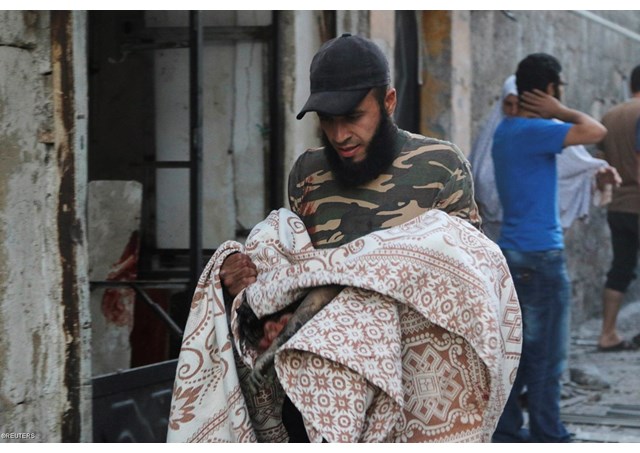
Horror and violence continue for the people of Syria

(Vatican Radio) Defying Syrian warnings, the United Nations has sent its first humanitarian aid convoy into rebel-held areas of the nation.
The decision was taken on Thursday as U.N. chief, Ban Ki-moon, accused warring parties of denying assistance to millions of people in need as a tactic of war.
Syria has made it quite clear it considers the deliveries of aid as unauthorized incursions into its territory.
Meanwhile, as poet, author and Syria expert Marius Kociejowski told Vatican Radio’s Linda Bordoni, the people of Syria are subjected to unabated horror.
Listen to the interview…
Kociejowski, spent time in Syria on various occasions and wrote extensively of its culture and its people ("The Street Philosopher and the Holy Fool" published in 2006, “The Pigeon Wars of Damascus" published in 2010, and the anthology “Syria through Writers’ Eyes", published in 2010). He speaks with pessimism regarding a possible resolution in the near future and says he thinks it will take “decades before the country recovers” from the current civil war and fundamentalist uprising.
“We have to remember ,the horror hasn’t stopped: the barrel bombs are being dropped on Aleppo every single day, people are being tortured in prisons, the regime is feeling comfortable enough to arrest those people involved in the very first peaceful protests, and those people are being killed in the prisons, and this will continue” .
Kociejowski says that whatever so-called peace agreement may be reached he thinks the regime “will continue with its catalogue of horrors”.
The writer says that today the most dangerous force in Syria is ISIS: “they now control a third of the country, they control the oil fields, but far worse than that, they are extremely fanatical in their views and perhaps more murderous than the regime”.
Kociejowski says that it is interesting to note that the regime hasn’t really taken action against ISIS, observing that this is probably because many of its members had been in Syrian prisons and were released.
He says that he thinks there is a certain ambiguity in the relationship between ISIS and the regime in that “ISIS is actually doing the regime’s work. The revolution has been stolen” he says.
Kociejowksi points out that the revolution began peacefully and Bashar al-Assad had every opportunity to relent and come to some good decisions, but - he points out: “he fell in with the old guard and now we are watching the consequences”.
He says that in his mind it is too late for the rest of the world to get involved: “there was a point when they could have exerted a tremendous amount of diplomatic pressure on Assad. The regime was sensitive to that pressure”.
But, Kociejowski concludes: “I think the response of the free world has been dismal. In the same way it’s dismal right now in not knowing what to do about the spread of ISIS throughout Iraq.”
| All the contents on this site are copyrighted ©. |


